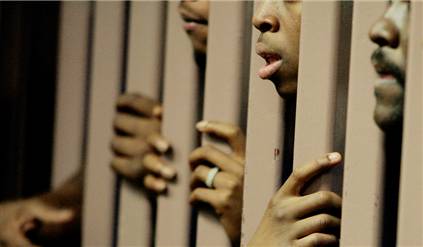 Among the provisions passed by the California legislature was another $150 million in cuts to the courts.
Among the provisions passed by the California legislature was another $150 million in cuts to the courts.
Yolo Superior Court Presiding Judge Rosenberg openly criticized the proposed budget plan which was being pushed through the Legislature on Wednesday. The proposed reductions would impose an additional $150 million, on top of a $200 million across-the-board cut already incurred by the judicial branch, and follows years of reductions to the Judicial Branch budget.
Judge Rosenberg added “To put this in context: jurors, litigants, witnesses, victims and defendants will see delays, backlogs and frustrations. Courts are the last best defense for democracy and justice – and the Legislature has chosen to slap justice in the face with these cuts to trial courts.”
The spending plan purports to close a remaining $9.6 billion deficit through various accounting maneuvers, additional fees, cuts and delayed payments.
Field Poll Finds Strong Support for Changes to Three-Strikes
The poll also found that 79 percent of those surveyed feel that the prison overcrowding problem and the release of inmates is serious. By a bare majority, voters are willing to support Governor Brown’s plan to transfer lower-risk inmates to county jails, however, they are not willing to support an extension of tax increases in order to pay for it.
In the Field Poll’s release, they state, “Despite their backing of Brown’s proposed inmate transfer, voters are not in agreement with the governor that the inmate transfer will require increasing state taxes to provide the counties with additional funds to house the new prisoners.”
When voters are asked whether they agree or disagree that more state taxes are needed for this purpose, 59% disagree, while 34% agree.
Republicans oppose the idea by an overwhelming 77-19 margin whereas Democrats are essentially split with 45 agreeing to raise taxes and 46% disagreeing. Republicans continue their strong opposition 64-28 when the temporary tax is added to the question, Democrats support a temporary tax by a 56-35 with independent narrowly opposing it 49-43.
In a statement from Field Poll Director Mark DiCamillo he stated, “Voters really are less supportive of the prisons and the budgets that are given to the prisons. They’d much rather fund the K-12 schools or higher education or health care.”
The striking finding, however, is on three-strikes. As we know, the voters in 1994 adopted the mandatory sentencing of a 25 year to life sentence after a third felony conviction, regardless of the seriousness of the third offense.
The result has been relatively minor offenses resulting in 25 year to life sentences. Yolo County had a high profile one where a man faced life for stealing a package of shredded cheese. While the DA, after much nationwide negative publicity, backed off the three strikes, the man eventually was sentenced to 8 years in prison.
Writes the Field Poll, “Critics of the law say that the one-size-fits-all sentencing procedure for repeat offenders is a major contributor to the state’s overcrowded prisons. Supporters of the law counter that a mandatory third strike sentence is required to maintain public safety and they point to recent declines in the crime rate as a demonstration of the law’s success.”
Voters, according to the Field Poll’s survey, strongly supported a modification that would “give judges and juries more discretion in deciding how long a person convicted of a third felony should be sent to prison as a way to ease prison overcrowding.”
The results indicate that about three in four voters (74%) agree that such a modification should be made, 46% of whom agree strongly. Large majorities of voters from each political party support this modification.
Democrats support the change 78 percent to 20 percent. Republicans support it 64 percent to 34 percent. And non-partisans and others support it 80 percent to 17 percent.
The changing numbers come in the wake of a strong and concerted effort to bring forward the issue of three strikes as a culprit for the state’s overcrowded prisons.
As we reported last week, researchers like Professor Robert Parker from UC Riverside believe that Three Strikes have had a major impact on the prison population but “little or no impact” on the rate of violent crime in Califorrnia as elsewhere.
According to Dan Walters who wrote on the matter last week, “He compared historic crime patterns in California and other states with similar laws to those without such laws and found they ‘show little difference in … pattern of violent crime.’ “
Mr. Walters added, “Parker cites other studies that attribute crime rate declines to economic and social factors, such as alcohol consumption, rather than policing and sentencing policies and suggests it’s ‘better to use alcohol policy to control violence than three strikes.’ “
“Were California to change its approach to crime and comply with the federal court order to reduce the prison population, he notes, it could save $2.3 billion a year in prison costs,” Mr. Walters notes.
“California needs to stop gorging itself at the all-you-can-eat buffet of imprisonment,” says Professor Parker.
The heart of Professor Parker’s research indicates that the law has cost the state billions of dollars per year.
“It ended up imprisoning a lot of people who had maybe one felony, violent felony, early in their life when they were a kid and had pretty much straightened out,” Professor Parker told KABC TV in Los Angeles last week. “Maybe a few minor offenses after that, but because of the law it captured up this whole population.”
—David M. Greenwald reporting





[quote]udge Rosenberg added “To put this in context: jurors, litigants, witnesses, victims and defendants will see delays, backlogs and frustrations. Courts are the last best defense for democracy and justice – and the Legislature has chosen to slap justice in the face with these cuts to trial courts.” [/quote]
But by golly Yolo County is going to have a brand new shiny courthouse!
[quote]In the Field Poll’s release, they state, “Despite their backing of Brown’s proposed inmate transfer, voters are not in agreement with the governor that the inmate transfer will require increasing state taxes to provide the counties with additional funds to house the new prisoners.”
When voters are asked whether they agree or disagree that more state taxes are needed for this purpose, 59% disagree, while 34% agree.[/quote]
Polls don’t mean a darn thing unless the questions are asked in a meaningful way, and within of context.
Correction: Judge Rosenberg; within context
Three Strikes is a failed experiment that needs to be totally removed or revamped.
Although, the budget is not perfect. I am very happy the legislatures finally provided a budget on time.
Field Poll is the most accurate and respected poll in the state Elaine. I’m sure they know that.
[quote]Field Poll is the most accurate and respected poll in the state Elaine. I’m sure they know that.[/quote]
LOL You missed my point entirely. I should have been more explicit. My apologies. The point is that if you ask voters a question out of context, and another question out of context, and get diametrically opposing views, then you did not frame the questions correctly. Polls results highly depend on the questions asked, who is asking them, how they are asked, when they are asked, who is asked, and the like.
I am all for prison reform, three strikes reform, and court reform. Have you noticed that no one has cut the District Attorney’s budget? He is living on prime rib with the ability and money to go full force on someone who steals $3.99 worth of cheese. Maybe, just maybe, if someone drew a line in the sand, he would realize that he only has enough money to prosecute the most serious crimes and leave the petty stuff alone. They also waste money and resources on wrongful prosecutions and investigations. He puts wrongful charges on people so he can draw down specific grant money. Reisig is a criminal of the worst element. He is no better than the UC Professional who was recently convicted of fudging her numbers to draw down grant money.
[b]lyah:[/b] [i]”Three Strikes is a failed experiment that needs to be totally removed or revamped.”[/i]
I generally agree with you about the failings of three strikes. In general, I don’t buy the notion of locking up most criminals for very long sentences. I tend to doubt a 10 year sentence is any more of a deterent than an 8 year or 6 year sentence.
If the person in prison is psychotic, he belongs in a mental hospital. If he has committed horrific acts of violence but is sane, he belongs in a pine box in the ground.
But getting rid of three strikes and fixing our mental health treatment system won’t get us very far.
The first thing we need to do to reduce crime is to regulate street drugs in such a way that people have little or no incentive to join the black market in drug sales. That solves most property crimes and a good percentage of violent crimes. Notice that we no longer have the people from Budweiser shooting it out on street corners against the people from Coors, ever since we regulated alcohol sales and distribution in 1933.
But a second thing we need to figure out is how to incarcerate people for a lot less money per year. It costs about $48,000 a year to keep someone in prison. About $20,000 of that is to pay the guards. Another $12,500 is the cost for medical and dental care for each inmate. The other $17,500 goes to operations, admin, inmate support (i.e., food, clothing, etc.) and rehab programs.
If we were serious about outsourcing, I am sure we could turn that $48,000 a year bill into $24,000 or less in the United States. (If we sent our prisoners to some poor country, like India or Brazil, we could probably get away with paying under $10,000 a year per inmate.)
And if we did outsource, we would have enough money for higher education in this state. The sad fact is that every marginal dollar which goes to prison expenses is a dollar removed from the UC and CSU systems:
[img]http://1.bp.blogspot.com/_OMGD4B1ySno/S196TMPLGKI/AAAAAAAAAaI/A8cmYRxwoyk/s320/LAOPrisonsUnisExpenditure.jpg[/img]
Outsourcing and shipping our problems elsewhere is also not an answer, whether it is to Arizona, Nevada or another country. We need to own up to the fact that we as a society seem to have very little understanding about what is really happening in our legal system. The Vanguard has really shed some light on what is happening in Yolo County, but it is also happening other places. We need to all come together for a workable solution.
[i]”… Outsourcing and shipping our problems elsewhere is also not an answer.”[/i]
The incarceration cost per prisoner in our state is out of control. We are getting ripped off. Consider that in 2009 Alabama spendt $15,118.30 ([url]http://www.doc.state.al.us/faq.asp#cost[/url]) to house each inmate in its prisons. By contrast, California spent $47,102 ([url]http://www.lao.ca.gov/laoapp/laomenus/sections/crim_justice/6_cj_inmatecost.aspx?catid=3[/url]) in 2008-09.
So if we outsourced our prisoners to a low-cost state, we could save upwards of $32,000 per inmate per year (and much more if we sent them to India or Brazil or Afghanistan). We have 143,435 inmates in our state prisons. If we saved $30,000 a year on each one by outsourcing, the state would have $4.3 billion freed up per year for higher education or other serious needs.
So when you cavalierly reject outsourcing to a cheaper state, at least know that your rejection comes with a steep price tag.
Elaine: I don’t think I missed your point, I just believe that the people at the Field Poll know how to conduct polls better than you or I.
[quote]Elaine: I don’t think I missed your point, I just believe that the people at the Field Poll know how to conduct polls better than you or I.[/quote]
Whether you or I are qualified to conduct polls is irrelevant to the issue I raised. Have you ever heard the expression “there are lies, damn lies, and then there are statistics”? One of the reasons why is bc of the way in which polls are taken. They can be severely biased depending on who is asking the questions, who is asked the questions, how the question is asked and in what context. It is not appropriate to ask someone “Should we trasfer state prisoners to local jails to save money?; then turn around and ask them “Are you willing to increase taxes to pay for more local jails?”. Your results are going to look ridiculous and contradictory. The more appropriate question to ask is “How much are you willing to have your taxes raised to accommodate a transfer of state prisoners to local jails?”
Rich, I respect your comments, but I was not cavalier about my rejection. I think that we have to deal with our problems as a society. I am not suggesting that you are not taking our societies problems seriously. I know you care about these issues from your other posts. But many people would like to simply deal with our over crowded prisons by shipping the inmates elsewhere instead of trying to understand how on earth did we get to this point with having the highest incarceration rate of the developed world. I don’t see more crime on our streets than other places I have traveled. So, why do we have more people locked-up? I believe because we as a voting public have bought the tough on crime politics. What does the average middle class law abiding citizen know truly about our legal system? Not much. But we really should. The overcrowded prisons are a symptom of a bigger problem and I think we need to get to the root of it. That is why I reject sending our problem somewhere else. Just as I reject sending my trash to another country. We should deal with our problems.
Sorry to be long winded. I just wanted to clarify. Thanks.